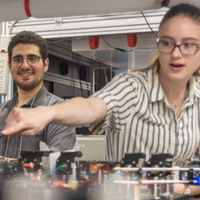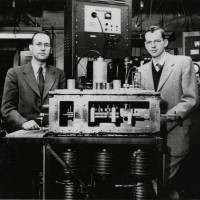The Columbia Quantum Initiative entangles its scientists and engineers to make fundamental discoveries about how to control the quantum properties of matter and light and accelerate new quantum innovations—turning science fiction into science facts in communications, computation, and sensing.
Learn More
Recent News
April 23, 2024
Making Light ‘Feel’ a Magnetic Field like an Electron Would
New observation could provide way to increase the strength of interaction between light and matter, eventually leading to smaller lasers and other improved photonic technologies.
April 22, 2024
Superradiant Atoms Could Push the Boundaries of How Precisely Time Can Be Measured
The result could have broad implications in areas such as space travel, volcanic eruptions and GPS systems.
April 08, 2024
Columbia Expert In The Verge | Microsoft says it’s cracked the code on an important quantum computing problem
Quantum computer scientist Henry Yuen comments on research from Microscoft and Quantinuum about making qubits that are less prone to error.
Upcoming Events
Collective Excitation Continuum in the Antiferromagnetic Heavy-fermion System U2Zn17
Collective Excitation Continuum in the Antiferromagnetic Heavy-fermion System U2Zn17
Center for Theoretical Physics. Pupin Hall, 8th Floor
12:30 PM - 1:30 PM
Event time is displayed in your time zone.Neutral Atom Quantum Computing with Nuclear Spin Qudits
Neutral Atom Quantum Computing with Nuclear Spin Qudits
705 Pupin Hall
12:00 PM - 1:00 PM
Event time is displayed in your time zone.2024 Rising Stars in Physics Workshop
2024 Rising Stars in Physics Workshop
Columbia University & Flatiron Institute
7:00 PM - 4:00 PM
Event time is displayed in your time zone.




